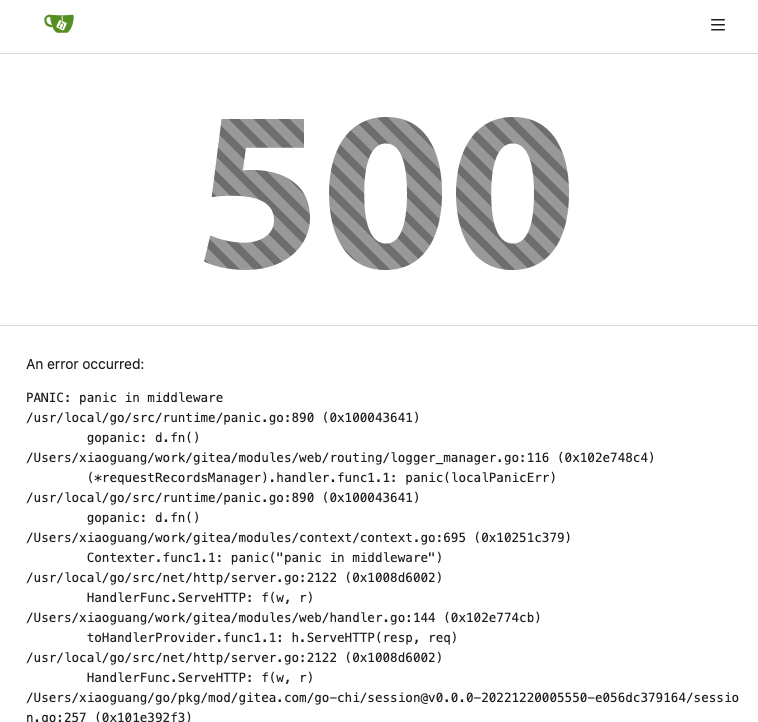Partially for #24457 Major changes: 1. The old `signedUserNameStringPointerKey` is quite hacky, use `ctx.Data[SignedUser]` instead 2. Move duplicate code from `Contexter` to `CommonTemplateContextData` 3. Remove incorrect copying&pasting code `ctx.Data["Err_Password"] = true` in API handlers 4. Use one unique `RenderPanicErrorPage` for panic error page rendering 5. Move `stripSlashesMiddleware` to be the first middleware 6. Install global panic recovery handler, it works for both `install` and `web` 7. Make `500.tmpl` only depend minimal template functions/variables, avoid triggering new panics Screenshot: <details>  </details>
115 lines
3.5 KiB
Go
115 lines
3.5 KiB
Go
// Copyright 2021 The Gitea Authors. All rights reserved.
|
|
// SPDX-License-Identifier: MIT
|
|
|
|
package common
|
|
|
|
import (
|
|
"fmt"
|
|
"net/http"
|
|
"strings"
|
|
|
|
"code.gitea.io/gitea/modules/cache"
|
|
"code.gitea.io/gitea/modules/context"
|
|
"code.gitea.io/gitea/modules/process"
|
|
"code.gitea.io/gitea/modules/setting"
|
|
"code.gitea.io/gitea/modules/web/middleware"
|
|
"code.gitea.io/gitea/modules/web/routing"
|
|
|
|
"gitea.com/go-chi/session"
|
|
"github.com/chi-middleware/proxy"
|
|
chi "github.com/go-chi/chi/v5"
|
|
)
|
|
|
|
// ProtocolMiddlewares returns HTTP protocol related middlewares, and it provides a global panic recovery
|
|
func ProtocolMiddlewares() (handlers []any) {
|
|
// first, normalize the URL path
|
|
handlers = append(handlers, stripSlashesMiddleware)
|
|
|
|
// prepare the ContextData and panic recovery
|
|
handlers = append(handlers, func(next http.Handler) http.Handler {
|
|
return http.HandlerFunc(func(resp http.ResponseWriter, req *http.Request) {
|
|
defer func() {
|
|
if err := recover(); err != nil {
|
|
RenderPanicErrorPage(resp, req, err) // it should never panic
|
|
}
|
|
}()
|
|
req = req.WithContext(middleware.WithContextData(req.Context()))
|
|
next.ServeHTTP(resp, req)
|
|
})
|
|
})
|
|
|
|
handlers = append(handlers, func(next http.Handler) http.Handler {
|
|
return http.HandlerFunc(func(resp http.ResponseWriter, req *http.Request) {
|
|
ctx, _, finished := process.GetManager().AddTypedContext(req.Context(), fmt.Sprintf("%s: %s", req.Method, req.RequestURI), process.RequestProcessType, true)
|
|
defer finished()
|
|
next.ServeHTTP(context.NewResponse(resp), req.WithContext(cache.WithCacheContext(ctx)))
|
|
})
|
|
})
|
|
|
|
if setting.ReverseProxyLimit > 0 {
|
|
opt := proxy.NewForwardedHeadersOptions().
|
|
WithForwardLimit(setting.ReverseProxyLimit).
|
|
ClearTrustedProxies()
|
|
for _, n := range setting.ReverseProxyTrustedProxies {
|
|
if !strings.Contains(n, "/") {
|
|
opt.AddTrustedProxy(n)
|
|
} else {
|
|
opt.AddTrustedNetwork(n)
|
|
}
|
|
}
|
|
handlers = append(handlers, proxy.ForwardedHeaders(opt))
|
|
}
|
|
|
|
if !setting.Log.DisableRouterLog {
|
|
handlers = append(handlers, routing.NewLoggerHandler())
|
|
}
|
|
|
|
if setting.Log.EnableAccessLog {
|
|
handlers = append(handlers, context.AccessLogger())
|
|
}
|
|
|
|
return handlers
|
|
}
|
|
|
|
func stripSlashesMiddleware(next http.Handler) http.Handler {
|
|
return http.HandlerFunc(func(resp http.ResponseWriter, req *http.Request) {
|
|
// First of all escape the URL RawPath to ensure that all routing is done using a correctly escaped URL
|
|
req.URL.RawPath = req.URL.EscapedPath()
|
|
|
|
urlPath := req.URL.RawPath
|
|
rctx := chi.RouteContext(req.Context())
|
|
if rctx != nil && rctx.RoutePath != "" {
|
|
urlPath = rctx.RoutePath
|
|
}
|
|
|
|
sanitizedPath := &strings.Builder{}
|
|
prevWasSlash := false
|
|
for _, chr := range strings.TrimRight(urlPath, "/") {
|
|
if chr != '/' || !prevWasSlash {
|
|
sanitizedPath.WriteRune(chr)
|
|
}
|
|
prevWasSlash = chr == '/'
|
|
}
|
|
|
|
if rctx == nil {
|
|
req.URL.Path = sanitizedPath.String()
|
|
} else {
|
|
rctx.RoutePath = sanitizedPath.String()
|
|
}
|
|
next.ServeHTTP(resp, req)
|
|
})
|
|
}
|
|
|
|
func Sessioner() func(next http.Handler) http.Handler {
|
|
return session.Sessioner(session.Options{
|
|
Provider: setting.SessionConfig.Provider,
|
|
ProviderConfig: setting.SessionConfig.ProviderConfig,
|
|
CookieName: setting.SessionConfig.CookieName,
|
|
CookiePath: setting.SessionConfig.CookiePath,
|
|
Gclifetime: setting.SessionConfig.Gclifetime,
|
|
Maxlifetime: setting.SessionConfig.Maxlifetime,
|
|
Secure: setting.SessionConfig.Secure,
|
|
SameSite: setting.SessionConfig.SameSite,
|
|
Domain: setting.SessionConfig.Domain,
|
|
})
|
|
}
|